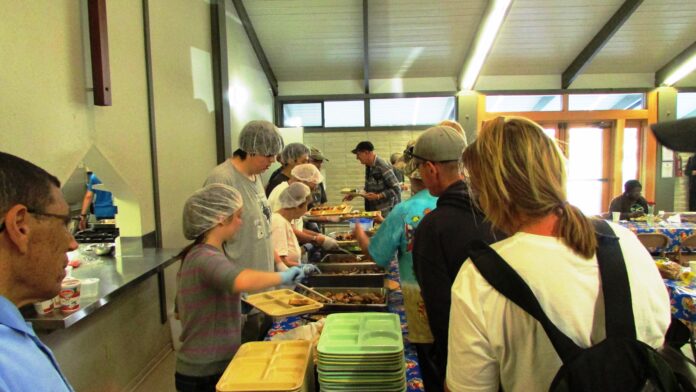Local resources support Davis unhoused population
By YAN YAN HUSTIS HAYES — city@theaggie.org
The last homeless census in 2019 counted 670 individuals experiencing homelessness in total; however, the actual homeless population in Davis is difficult to measure due to the pandemic as well as seasonal variation. Because of this, many Davis based organizations work year round to provide services and programs for those experiencing homelessness in the area.
Executive Director of Davis Community Meals Bill Pride explained that Davis Community Meals began its first meal program in 1991 and has since expanded to include services like street outreach, shelter, employment programs and programs for homeless families.
“Our first program was a soup kitchen meal program to serve folks who were [experiencing] homelessness or impoverished or needy in the community,” Pride said. “Since then we’ve expanded to have a variety of programs—our meal program has expanded from one night to three days a week and we’ve moved into providing transitional housing and shelter.”
While the exact number varies based on the time of year, these programs serve around 400 homeless individuals, according to Pride.
“Some folks are only in town once in a while,” Pride said. “In Davis we serve well over 400 homeless individuals and that’s just because people come to stay for a little bit, we give them services and they move somewhere else.”
While increased attention is paid to homelessness over the winter months, people experience homelessness year-long. Pride stressed that there is a continual need for services.
“I know folks think that the wintertime months [are important] because of the cold and the rain, but [the homeless] need services year-round,” Pride said. “In some respects, the summertimes here are probably even more treacherous for homeless folks because of the heat.”
Those who wish to learn more about Davis Community Meals or explore volunteer opportunities should visit the Davis Community Meal website. A full list of homeless services in Yolo County including clinics, soup kitchens and case management can be found on the County’s website.
In addition to shelters and food programs for the Davis homeless population, those experiencing homelessness can also find service for their pets through the Davis Pet Advocacy and Wellness (Davis PAW’s) veterinary clinic. Davis Paw Clinic Head Coordinator Haley Stein explained that the clinic was started by a group of third-year veterinary students and one veterinarian just last year.
“They saw the need for the homeless population to have veterinary care in Davis,” Stein said. “There are a lot of programs in the area but there wasn’t anything in Davis. [Now] we usually have ten to twenty vet student volunteers.”
Stein, a second-year vet student at UC Davis School of Veterinary Medicine, explained that the clinics are held once a month at the Respite Center in Davis and address an important need for veterinary care.
“It varies from about five to twenty clients per clinic and the [number] of pets varies too because some people will have multiple,” Stein said. “There are a lot of people who are unhoused in the area who have pets and it’s not something that you really think about a lot. They care a lot about their animals and it’s pretty much the thing that keeps them going.”
The idea that people experiencing homlessness and who subsequently don’t have enough money to take care of their animals don’t deserve them is a common misconception, according to Stein.
“I would say [that] the biggest thing that I’ve learned doing this is that these people care so much about their animals and deserve to have the best care possible,” Stein said. “If you want to get involved you can.”
More information about volunteering opportunities for undergraduate students and veterinary students alike as well as more information about the program can be found on the Davis PAW clinic website.
One on-campus resource that is specifically geared towards students is the Aggie Compass Basic Needs Center, whose mission is to help mitigate the effects of food and housing insecurity. Director of the UC Davis Basic Needs Initiative and Aggie Compass Basic Needs Center Lesile Kemp explained that the Aggie Compass serves about 10% of the student population.
“We are looking to double and triple that percentage over the next few years,” Kemp said via email. “We also get non-students seeking support and in these cases we help connect them with community resources.”
Kemp encouraged students who are struggling to get basic necessities or experiencing homelessness to reach out to the Aggie Compass for services such as a rapid rehousing program for students, grants for students with financial hardships, hotel vouchers and consultations.
“If anyone out there is skipping meals or living in their car thinking, it’s not that bad there are people who need help more than I do…just come see us,” Kemp said. “If you don’t want to stop by in person, fill out a basic needs assistance form on our website and we’ll reach out to you.”
Listening to the needs of unhoused students is an important part of how the Aggie Compass makes sure its services are supporting students as best as possible. Kemp asked that any unhoused students who are willing to talk about what the Aggie Compass can do to support students living in cars and vans reach out to Kemp directly or to the Aggie Compass.
“I have tremendous respect for our students that are unhoused and working towards a degree from UC Davis,” Kemp said. “They have to do so much just to stay safe, eat and find a place to sleep that being successful academically seems almost impossible. We listen to our students.”
While the Aggie Compass is still working on restarting its volunteer program, students who want to get involved should reach out to Aggie Compass partner programs like the ASUCD Pantry, Fruit & Veggie Up! and the Food Recovery Network.
Written by: Yan Yan Hustis Hayes — city@theaggie.org




